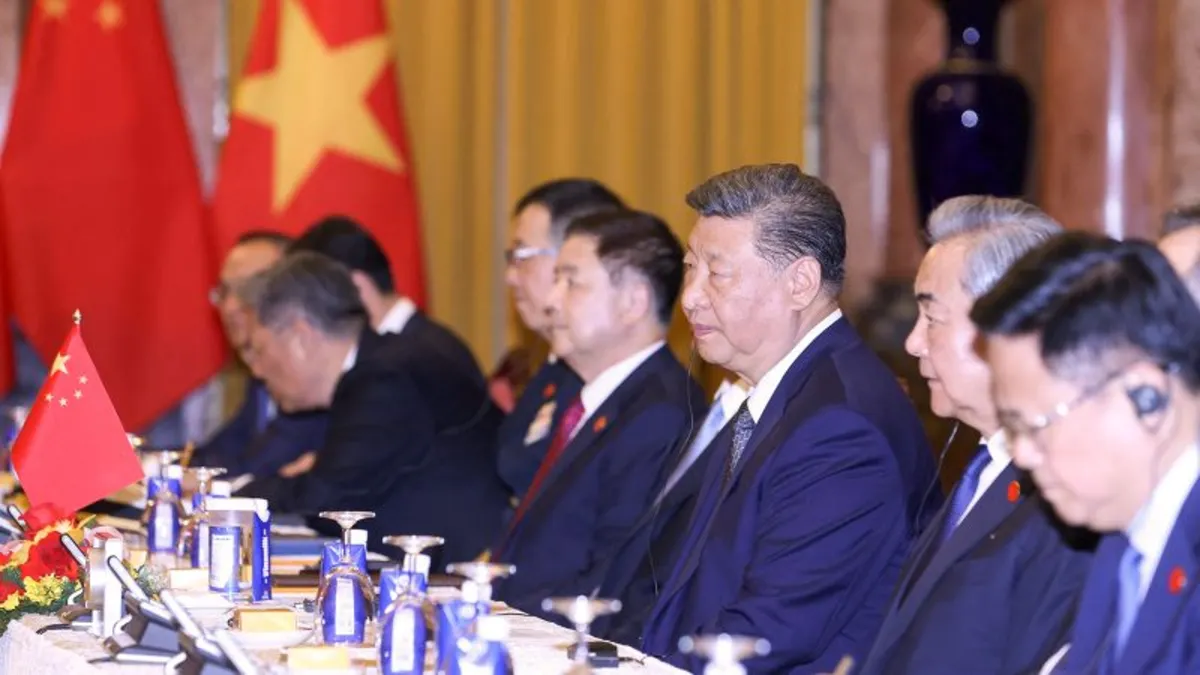
In a bold statement reflecting the ongoing US-China trade tensions, Beijing has cautioned its trading partners against yielding to US pressure aimed at isolating China during President Donald Trump's tariff war. This warning is part of China's strategic carrot-and-stick approach intended to sway countries caught in the middle of the world's two largest economies.
Commenting on recent media reports regarding the Trump administration's tactics to compel nations to limit trade with China in exchange for tariff exemptions, a spokesperson for China’s Commerce Ministry stated, “Appeasement does not bring peace, and compromise does not earn respect.” The spokesperson further emphasized that seeking temporary self-interest at the expense of others, in return for so-called exemptions, is akin to “asking a tiger for its skin.” Ultimately, the spokesperson warned that this approach would lead to harm for both the countries involved and their own interests.
China firmly opposes any agreements that may come at the cost of its interests, with the spokesperson affirming that if such a scenario arises, China will not accept it and will take resolute reciprocal countermeasures. This stern message follows Chinese leader Xi Jinping’s recent charm offensive in Southeast Asia, where he portrayed China as a trustworthy partner and a staunch defender of global trade, contrasting sharply with the uncertainty and tariff chaos associated with the Trump administration.
Countries and businesses are feeling the pressure as they navigate the choppy waters between the two economic superpowers. The escalating conflict has led to record tariffs imposed by both the US and China, disrupting global supply chains and fueling fears of a recession. On April 9, Trump temporarily paused his “reciprocal” tariffs on most nations for 90 days, redirecting his focus solely on China, which saw tariffs on its imports soar to an astonishing 145%.
In retaliation, China raised tariffs on US goods to 125% and added several American companies to its export control and unreliable entity lists. Additionally, Beijing has taken steps to inflict pain on key US industries by limiting the number of Hollywood films screened in China and returning at least two Boeing jets intended for Chinese airlines back to the US.
As both nations remain entrenched in their positions, neither leader shows signs of backing down. Both the US and China are working to build a coalition of nations against each other. Recent reports from The Wall Street Journal suggest that the Trump administration intends to utilize ongoing tariff negotiations to pressure US trading partners into limiting their dealings with China. The goal is to extract commitments that would effectively isolate China’s economy in exchange for concessions on trade and tariffs.
In response to the tumultuous trade landscape, China is looking to capitalize on the uncertainty created by Trump. Xi Jinping recently traveled to Vietnam, Malaysia, and Cambodia, where he signed multiple bilateral cooperation agreements and pledged to uphold free and open trade. This initiative is particularly significant for these export-reliant economies, which faced US tariffs of up to 49% before the suspension was announced.
Chinese officials have also engaged in discussions with counterparts in Japan, South Korea, and the European Union, promoting closer economic cooperation. However, while many countries are receptive to China's outreach, they remain cautious about the potential influx of cheap Chinese goods, which are currently barred from US markets due to high tariffs. Furthermore, the risk of inciting Trump’s ire for siding with China complicates these nations' decisions.
Despite China's diplomatic overtures, the country's history of economic coercion, aggressive trade practices, and assertive military actions in the region pose significant challenges. Elizabeth Economy, a senior fellow at the Hoover Institution at Stanford University, pointed out that even though China may be a larger trading partner for some nations, the United States often represents a much larger export market. As a result, these nations have substantial stakes in maintaining favorable relations with the US economy.
Moreover, even as Xi embarks on his charm offensive, Beijing continues its military assertiveness in the region. This includes live-fire drills near Australia and New Zealand, aggressive actions against Taiwan, the Philippines in the South China Sea, and Japan regarding the Senkaku Islands in the East China Sea. Economy remarked that China’s security ambitions do not seem to waver despite its attempts to present itself as a stabilizing economic force, suggesting that Xi's charm offensive must be more comprehensive to yield the desired benefits amid the ongoing trade conflict with the US.
This article has been updated with additional information regarding the evolving situation between the US and China.